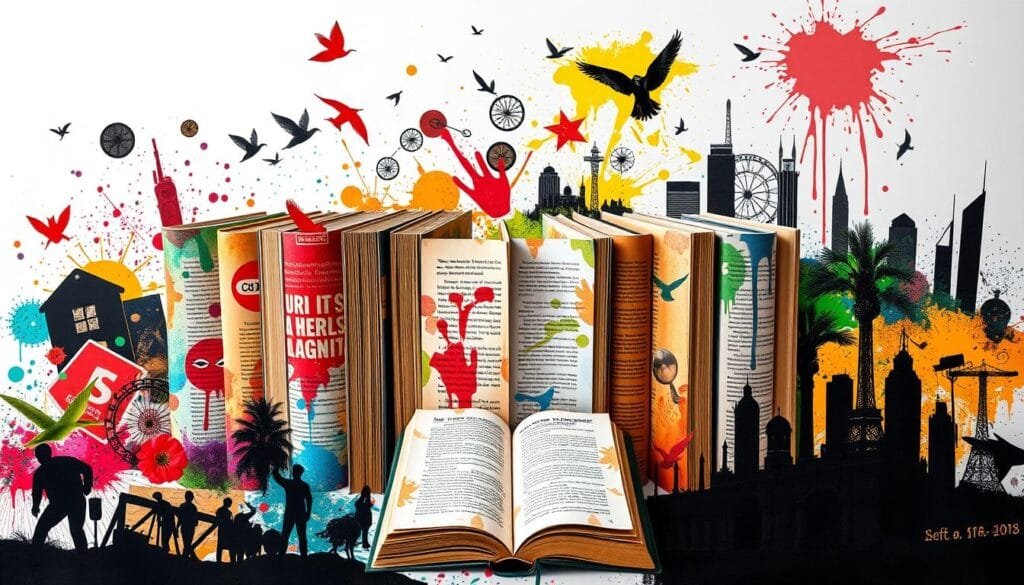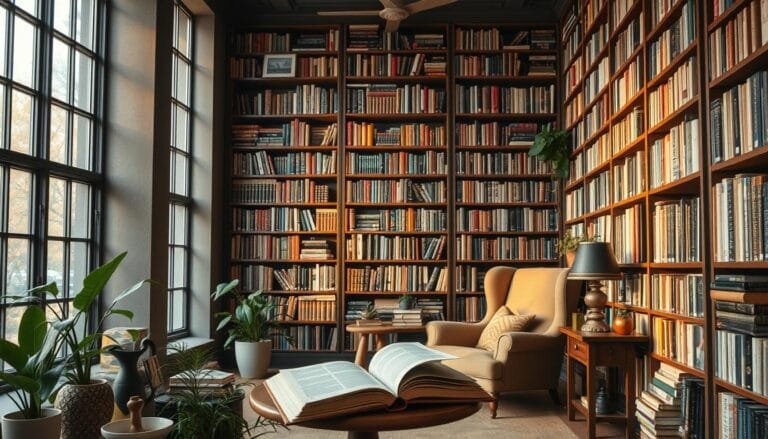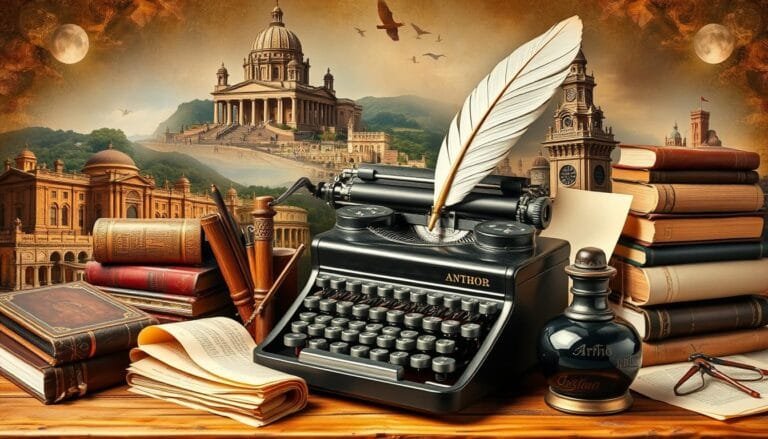Discover Classic and Modern Literature: Your Reading Guide

Did you know Mark Twain’s “Adventures of Huckleberry Finn” has the n-word 219 times? Yet, it’s a key piece of classic literature. Literature, both old and new, is full of stories that show us different sides of human life. Whether you’re reading Homer’s “Odyssey” or Mohsin Hamid’s “The Reluctant Fundamentalist,” this guide will help you explore through time.
Welcome to your ultimate reading guide. By exploring classic and modern literature, you’ll find stories that entertain and challenge you. This guide opens a door to a world where every page invites you to discover and reflect.
What is Literature?
Exploring literature takes you on a journey through time, culture, and human expression. It includes written and spoken materials that have amazed millions for centuries. Literature is always changing, reflecting and shaping our world.
Definition and Scope
The definition of literature is wide-ranging, from ancient stories to today’s digital texts. Merriam-Webster’s Collegiate Dictionary says it’s about writings that stand out in form or expression. It also covers lasting ideas.
This broad definition lets us include many types of writing. For example, poems, epic stories, and plays are all part of it. But not everything is literature; technical and scholarly works are usually not included. Literature spans English, French, African, and American works, showing its literary significance across cultures and languages.
The Evolution of Literature
The literature evolution is a captivating story from ancient tales to today’s novels. At first, stories were told orally, then written down. This led to a wide range of texts like novels, essays, and autobiographies.
The history of literature has been influenced by powerful cultures and economies. But in recent years, more diverse voices have been included. For example, Herman Melville’s Moby-Dick was initially ignored but is now a key part of American literature.
Understanding literature’s layers can make your reading more enjoyable. It also helps you see how writing has changed over time. For more insights and FAQs, visit our FAQs section.
The Importance of Literature
Literature is more than just words on a page. It opens a door to understanding human experiences and the world’s complexities. It’s crucial because it enhances empathy and reflects our culture deeply.
Enhancing Empathy
Through literature, you can enter the lives of various characters and experience different situations. This helps you grow in empathy. Reading about others’ lives and views helps you understand their feelings and perspectives better.
A 2023 study found that students who read well had better social skills than those who didn’t. This shows how reading can improve emotional intelligence.
Cultural Reflection
Literature mirrors our society, showing us norms, values, struggles, and changes. It offers insights into cultures through the ages. Today, more books are being published than ever, showing a growing interest in diverse voices.
However, there’s a need for more inclusivity to truly represent all human experiences. Reading diverse literature broadens your view, teaching you about the world’s cultures.
In the end, literature is a unique tool that builds empathy. It gives us a way to see and understand the world’s cultural complexities.
Classic Literature You Should Read
Dive into the profound depths of classic literature with stories that have shaped generations. These works offer timeless insights and pleasures, making them must-reads for every book lover.
Timeless Novels
“Pride and Prejudice” by Jane Austen, published in 1813, critiques societal expectations. It follows Elizabeth Bennet and Mr. Darcy’s evolving interactions. Another essential read is “Great Expectations” by Charles Dickens, exploring wealth, social class, and misguided aspirations.
Mary Shelley’s “Frankenstein,” published in 1818, raises significant questions about humanity and the consequences of scientific exploration. No list of classic literature would be complete without “Don Quixote” by Cervantes. It has sold over 500 million copies since its release in the early seventeenth century.
Iconic Poets
The rhythmic brilliance of iconic poets like Emily Dickinson and Walt Whitman has left an indelible mark on literature. Dickinson’s innovative use of meter and rhyme provides fresh perspectives on themes of life, death, and immortality. Meanwhile, Whitman’s “Leaves of Grass” revolutionized American poetry with its free verse and celebration of individuality.
These influential poets offer profound insights and rich interpretations through their masterful use of language.
Influential Playwrights
Influential playwrights such as William Shakespeare and Anton Chekhov have crafted enduring works that continue to captivate audiences. Shakespeare’s plays like “Hamlet” and “Othello” delve into human nature, ambition, and tragedy. Chekhov’s works, including “The Cherry Orchard,” explore deep psychological and social themes.
Reading these playwrights enriches our understanding of drama and the complexities of life.
Modern Literature Trends
In today’s world, modern literature trends focus on voices that were once ignored. They also use digital platforms in new ways. These changes can make your reading more exciting and informative.
The Rise of Diverse Voices
One big trend is the growth of diverse voices in literature. Authors like Margaret Atwood and Haruki Murakami are leading the way. Their books explore topics like gender, politics, and finding oneself.
This trend does more than just add new views. It makes literature richer and more varied.

Digital Literature
The digital age has brought us digital literature. This includes interactive stories, digital books, and multimedia works. Famous authors like J.K. Rowling and Stephen King are diving into this new world.
These modern literature trends are changing how we read and write. They open up new ways for authors to connect with readers worldwide.
| Category | Examples |
|---|---|
| Modernist Writers | W.B. Yeats, Joseph Conrad, Virginia Woolf |
| Contemporary Authors | J.K. Rowling, Stephen King, Haruki Murakami |
| Types of Contemporary Literature | Young Adult Fiction, Graphic Novels, Science Fiction |
The mix of modern literature trends, diverse voices in literature, and digital literature marks a thrilling time for books. These changes are not just about what we read. They’re about how we experience it, offering endless possibilities for both writers and readers.
How to Choose the Right Book
Choosing the right book can be both exciting and challenging. With so many books published every year, it’s hard to pick just one. You need a guide that matches your tastes and interests. This section will show you how to find your next great read.
Consider Your Interests
First, think about what you enjoy reading. Do you love mystery novels or literary fiction? Websites like Goodreads and BookRiot offer lists based on your interests.
About 78% of people get book tips from friends, family, and online influencers. These trusted sources can help you choose. Also, 60% of readers look at star ratings and awards to judge a book’s quality.
Exploring Different Genres
Exploring different literary genres can open up new worlds. Each genre offers its own style and story. For example, NoveList offers expert book suggestions across various genres.
Don’t just read the latest bestsellers. Try out different genres to find what really interests you.
| Source | Usage Percentage |
|---|---|
| Recommendations from Friends, Family | 78% |
| Goodreads and BookRiot | 65% |
| Public Opinion (Ratings and Awards) | 60% |
| Book Descriptions | 20% |
The Role of Literary Criticism
Literary criticism helps us understand literature better. It gives us tools to analyze texts deeply. This includes interpreting and judging works, and seeing them from different viewpoints. This way, we get a fuller picture of what literature means.
Understanding Different Perspectives
Exploring various criticism movements gives us new insights. For example, historical-biographical, moral-philosophical, and new criticism each offer unique views. These perspectives help us see literature from many sides.
Historical-biographical criticism looks at a work through the author’s time. Moral-philosophical criticism checks the text’s ethics and philosophy. These methods encourage us to dive deeper into what we read.
Key Criticism Movements
Criticism movements have changed how we analyze literature. From Renaissance criticism in 1498 to New Criticism in the 20th century, each era brought new ways to evaluate literature. Knowing these movements helps us understand modern works better.
Today, feminist theory and critical race theory are shaping literary criticism. They make sure diverse voices are heard. They also show how literature reflects and challenges society.
Platforms like Twitter have made criticism more open. Both famous and new critics can share their views. This has made criticism more accessible and lively, even if it can be contentious.
In short, literary criticism is key to understanding and enjoying literature. By exploring different perspectives and recognizing important movements, we enrich our literary culture. For more on literary criticism, visit this page.
Recommended Reading Lists
Our reading lists are for everyone, whether you love old stories or new ones. They help you find books that match your taste. You’ll find classics, modern stories, and books in genres like sci-fi, romance, and historical fiction.
For Classic Literature Lovers
Explore timeless stories that have shaped literature. Read works by Charles Dickens, Jane Austen, and Mark Twain. Their stories and characters are truly unforgettable.
For Contemporary Readers
Modern stories offer new views and themes that reflect today’s world. Discover authors like Chimamanda Ngozi Adichie or J.K. Rowling. They bring fresh ideas and relevance to their stories.
Genre-Specific Recommendations
Find books that match your interests. Whether you love science fiction, romance, or historical fiction, we have something for you.
| Genre | Recommended Book | Author |
|---|---|---|
| Science Fiction | Dune | Frank Herbert |
| Romance | Pride and Prejudice | Jane Austen |
| Historical Fiction | The Book Thief | Markus Zusak |
Whether you enjoy classic or modern literature, we have something for you. Our reading lists and genre recommendations offer a wide range of books. Let these stories take you on exciting journeys.
Benefits of Joining a Book Club
Exploring the amazing book club benefits can change how you read. Book clubs are more than just reading; they build a lively literary community. Here, people share their love for books and have deep talks.

Building Community
Being in a book club means joining a group of readers who support each other. You become part of a tight literary community. Here, friendships grow from shared book experiences and love for reading.
This sense of belonging brings not just friends but also emotional support. It creates a space for personal growth.
Engaging Discussions
The core of a book club is its engaging discussions. These lively talks help you understand books better. You get new ideas that you might not think of alone.
Book clubs also introduce you to books you might not find on your own. You get to explore different genres and authors. This broadens your reading world.
Book clubs also help you stay on track with your reading. They make you feel responsible to read and prepare for meetings. This habit helps you grow your knowledge and keeps your reading consistent.
Book clubs also boost your well-being. Studies show they can help you live longer after retirement. They offer a break from daily stress, letting you dive into stories and talks.
In short, joining a book club makes your reading journey richer. It connects you with a passionate literary community and opens doors for engaging discussions. It’s a way to grow your reading, think better, and enjoy good company.
Literary Festivals and Events
Literary festivals and events are lively gatherings that bring together writers, critics, readers, and publishers. They celebrate the written word and offer networking opportunities. These can lead to exciting collaborations and new projects.
Celebrating Writers and Readers
The Newburyport Literary Festival is celebrating its 19th year in 2024. It shows the lasting love for literature. Since 2005, the Newburyport Literary Association has highlighted famous authors and helped new writers.
They offer eight-week writing classes. The festival is supported by donations, which are tax-deductible. This support helps venues, author travel, and more.
Opportunities for Networking
Events like the Jamaica Book Festival and the Greater Naples Jewish Book Festival are great for networking. They run until December 8, 2024, and April 3, 2025, respectively. These festivals are perfect for meeting others who share your interests.
Writing contests and book awards, like the Massachusetts Book Awards, are also opportunities. They allow emerging talents to showcase their work. The deadline for the Massachusetts Book Awards is December 15, 2024.
| Event | Dates | Key Details |
|---|---|---|
| Jamaica Book Festival | Until Dec 8, 2024 | Includes various sessions and author meet-and-greets. |
| Greater Naples Jewish Book Festival | Until Apr 3, 2025 | Features bestselling authors and interactive sessions. |
| Newton Children’s Book Festival | Dec 14, 2024 | Activities tailored for young readers and families. |
| Cleveland Jewish Book Festival | Jan 1, 2025 | Kick-starts with New Year celebrations and literary discussions. |
| Panorama International Literature Festival | Jan 1, 2025 | Showcases global literary voices and cultural exchange. |
| Winter Poetry & Prose Getaway | Jan 1, 2025 | Workshops and readings for poetry and prose enthusiasts. |
| Colrain Poetry Manuscript Conference | Jan 17, 2025 | Intensive manuscript review sessions with experts. |
Exploring Poetry
The world of poetry is full of depth and variety. It invites you to explore its rhythmic and evocative qualities. By exploring poetry, you’ll find both classic and modern works that evoke emotions and spark thought.
Understanding major poets and different forms of poetry enhances your appreciation. It also sharpens your analytical skills.
Major Poets to Know
Meeting influential poets can start your literary journey. William Shakespeare, found in 90% of high school curricula, is a key figure. He’s known for his dramatic and lyrical works.
William Wordsworth, in 75% of curricula, introduced Romanticism with his nature-focused poems.
Edgar Allan Poe, Sylvia Plath, and Langston Hughes have also made big impacts. Poe’s works, in 60% of curricula, are eerie and imaginative. Plath’s confessional style is in 40% of curricula. Hughes, in 50% of programs, reflects on African-American experiences.
Understanding Form and Structure
Appreciating poetry requires understanding its forms and structures. From sonnets to free verse, there’s a wide range. Each form offers a unique way to see the world.
Sonically rich poems like villanelles and sestinas are gaining popularity. They’re found in educational settings and writing communities.
| Type of Poetry | Percentage Studied in Courses |
|---|---|
| Epic poetry | 15% |
| Lyric poetry | 30% |
| Drama | 20% |
| Narrative poetry | 15% |
| Free verse | 20% |
Free verse is popular among modern poets. Surveys by the Academy of American Poets show a big increase in its use. Traditional forms like haikus and ghazals are also loved for their concise and evocative qualities.
Exploring these forms and structures reveals how words’ arrangement affects their meaning. Poets use these frameworks to share deep themes, ideas, and emotions. Whether it’s metaphors, imagery, or alliteration, poetry offers endless ways to explore and appreciate.
The Impact of Literature on Society
Literature has always played a key role in shaping how we see the world. Authors bring up important issues like classism, racism, and social justice through their stories. This makes us think about our values and the world we live in.
Studies by Kidd and Castano (2019) found that reading literary fiction boosts emotional intelligence. It also helps us think critically. These skills are vital for making positive changes in society.
Literature and Social Change
Books like “To Kill a Mockingbird” by Harper Lee and “1984” by George Orwell spark important discussions. They help us understand complex human experiences and conflicts. This way, we can empathize and see things from different viewpoints.
Books reflect our society’s problems and push us to make a difference. They inspire us to work towards a better world.
Literature in Education
In schools, literature is crucial for developing well-rounded students. Courses on literary analysis teach critical thinking and analysis. These skills are essential for understanding the world.
Through literature, students learn about different cultures and develop empathy. They gain a deeper appreciation for diversity and the complexities of human experiences.
Literature is a powerful tool for education and social change. It challenges our norms and encourages us to strive for a more inclusive society. By exploring these themes, readers can help create a more understanding world.
Future of Literature
Looking ahead to 2024 and beyond, literature is changing in exciting ways. New trends like augmented reality and AI-driven stories are transforming the field. These changes are making literature more diverse and interactive in our modern world.
Trends to Watch
AI-generated content is a big trend in literature. It can write like a human and create stories. This technology helps authors by offering ideas and checking their work.
AI also helps readers find books they’ll love. It suggests books based on what they like to read. This makes reading more personal and fun.
The Role of Technology
Technology is more than just AI in literature. It includes tools that help writers get past writer’s block. These tools also help with creating characters and worlds.
But, there are challenges too. Some worry that AI might replace human writers. There are also questions about who owns the rights to AI-generated work. Yet, using technology wisely can make literature better and more interesting.
As we look at the future of literature, technology will keep changing how we read and write. AI will help readers find books they’ll enjoy. This mix of human creativity and technology will make literature more exciting and open to everyone.
Disclosure: This post contains affiliate links. If you make a purchase through these links, I may earn a small commission at no extra cost to you.






